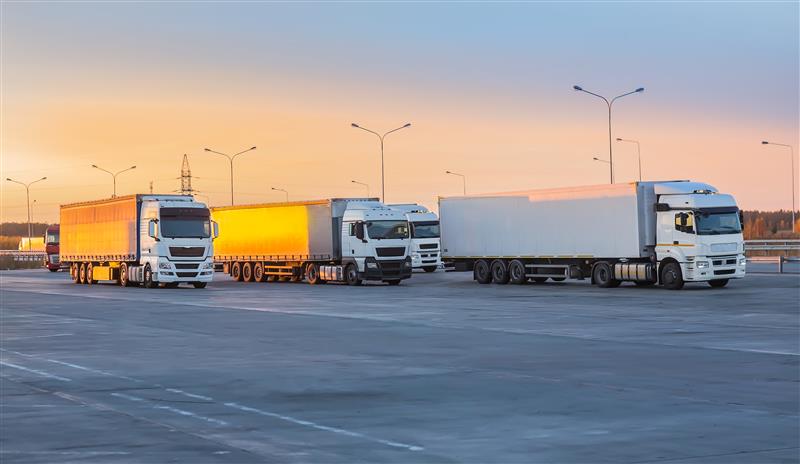
Guest
Må lastbiler køre i Europa om søndagen?
Oprettet: 23.12.2024
•
Opdateret: 23.12.2024
At navigere i forbuddet mod søndagskørsel med lastbil i Europa kræver en omfattende forståelse af landespecifikke regler, sæsonvariationer og effektive strategier. Ved at investere i grundig ruteplanlægning, holde sig informeret, optimere driften og udnytte teknologien kan flådevirksomhederne afbøde virkningerne af disse restriktioner.
I denne blog undersøger vi de forskellige regler i en række europæiske lande og dykker ned i de bedste måder at tilpasse sig dem på.
Landespecifikke regler
Hvert land har sine egne love om forbud mod søndagskørsel, og de kan variere meget.
Tyskland
Fra kl. 12 til 22 på ugens sidste dag må lastbiler, der vejer mere end 7,5 tons, ikke køre. Men det er ikke nødvendigvis afskrækkende. Kombinerede transporter kan nyde godt af særlige tilladelser, hvor jernbane- og vejtransport er tilladt inden for 200 kilometer fra på- eller aflæsningsstationer, og havne- eller vejtransport er tilladt inden for 150 kilometer fra havne. Transport af visse letfordærvelige varer er også undtaget, f.eks. frisk mælk, mejeriprodukter, kød, fisk, frugt og grøntsager.
Derudover er visse køretøjer og aktiviteter ikke omfattet af forbuddet, f.eks. udrykningskøretøjer, der er involveret i bjærgning, bugsering eller havarikørsel.
Frankrig
I dette område gælder der samme kørselsrestriktioner som i Tyskland for lastbiler på over 7,5 tons. Disse forbud gælder på søndage og helligdage fra kl. 12 til 22.
Derudover er der restriktioner om lørdagen og dagen før nationale helligdage, hvor det er forbudt at køre fra kl. 22 til kl. 12. Og om sommeren er der forbud på bestemte lørdage fra kl. 7 om morgenen til kl. 19 om aftenen.
Der findes undtagelser for visse varer, herunder mejeri- og kødvarer, samt udrykningskøretøjer. Overtrædelse af disse forbud kan føre til betydelige bøder på mellem 750 og 3.750 euro for henholdsvis enkeltpersoner og virksomheder.
Italien
Lastbiler må ikke køre på vejene på søndage og helligdage fra kl. 9 til 22 i Italien. Det er værd at bemærke, at i juni, juli, august og september starter forbuddet tidligere kl. 7 om morgenen - men det slutter stadig kl. 22 om aftenen.
Landet indfører også yderligere restriktioner i sommermånederne. I juli er der embargo om lørdagen fra kl. 8 til kl. 16, og det gælder også fra kl. 8 til kl. 22 i august.
Det er de generelle regler, men det er vigtigt at vide, at der kan være lokale variationer eller midlertidige restriktioner på visse ruter. Ligesom i Frankrig og Tyskland kan der også være undtagelser for bestemte typer varer eller nødtjenester.
Spanien
Hvad angår Spanien, er det et meget mere komplekst scenarie. Der er et kludetæppe af regionale forbud, især i Catalonien. Kørselsrestriktioner for lastbiler kan ændre sig baseret på lokale regler, helligdage og specifikke ruter. Lastbilchauffører, der kører her, bør konsultere lokale retningslinjer for at sikre, at de overholdes.
Ud over påbuddene om søn- og helligdage er der også begrænsninger på visse lørdage i sommermånederne. De gælder generelt fra kl. 8 til kl. 12, især i juli og august, hvor trafikken er tungere på grund af feriegæster.
Andre lande
Når det gælder andre europæiske lande, er der mange, der også håndhæver deres egne forbud mod søndagskørsel. Østrig dikterer for eksempel, at lastbiler, der vejer over 7,5 tons, ikke må køre på vejene om søndagen fra kl. 12.00 til 22.00. Schweiz har noget lignende, hvor køretøjer på over 3,5 ton ikke må køre hele dagen.

Strategier for flådevirksomheder
Effektiv ruteplanlægning er afgørende for at kunne navigere i søndagens restriktioner for lastbilkørsel. Ved at bruge avanceret teknologi og strategisk tænkning kan flådeoperatører optimere deres processer.
Brug GPS og software til ruteplanlægning
Ved at bruge moderne GPS-systemer og [ruteplanlægningssoftware] (https://snapacc.com/newsroom/route-optimisation-with-fleet-management-software-snap-account/) kan flåderne og deres chauffører finde frem til de mest effektive ruter og samtidig undgå områder med kørselsforbud. Disse værktøjer kan give opdateringer i realtid om vejforholdene og sikre, at lastbilchaufførerne kan træffe informerede beslutninger på farten.
Overvej alternative ruter
En anden idé er at udforske forskellige måder at komme til det pågældende sted på. Selv om det kan være fristende at holde sig til den mest direkte vej, kan alternative ruter ofte spare tid og undgå potentielle bøder. Sådanne omveje kan være lidt længere, men kan hjælpe med at omgå områder med strenge embargoer, hvilket giver mulighed for mere gnidningsløse operationer.
Planlæg for forsinkelser
I betragtning af muligheden for tilbageslag forårsaget af trafikpropper eller kørselsforbud er det også klogt for flådevirksomheder at indbygge ekstra tid i deres tidsplaner. En proaktiv tilgang giver bedre mulighed for, at leverancerne forbliver rettidige - selv i tilfælde af uventede udfordringer.
Hold dig informeret
Det er lige så vigtigt at holde sig opdateret om regler og trafikforhold i realtid. Derfor er det klogt at bruge specifikke apps og hjemmesider - de giver lastbilchauffører live-opdateringer om vejspærringer, ulykker og trafikpropper, så de kan justere deres ruter og undgå forsinkelser.
Mange transportorganisationer og logistikudbydere tilbyder abonnementer på trafikmeldinger. Ved at tilmelde sig disse meddelelser kan flådeoperatører modtage oplysninger om eventuelle ændringer i kørselsreglerne og sikre, at de overholder dem.
Udnyt teknologien
Udnyttelse af teknologi kan forbedre driftseffektiviteten og overholdelsen af [køretidsregler] (https://snapacc.com/newsroom/drivers-working-time-directive-a-guide-for-truck-drivers/).
Telematiksystemer giver flådevirksomheder mulighed for at overvåge køretøjernes placering, brændstofforbrug og chaufførernes adfærd. Dataene kan være uvurderlige til optimering af ruter. Desuden er det nemmere at føre digitale logbøger, og det giver vigtig dokumentation i tilfælde af en revision.
Lige så vigtigt er det, at teknologien forenkler betalingerne - og det er her, SNAP kan hjælpe.
Tilmeld dig SNAP
Uanset om du er på udkig efter sikker parkering, lastbilvask eller andre tjenester til din flåde, gør vores løsninger det meget mere bekvemt at betale for dem. Se, hvad SNAP kan tilbyde dig i dag.


